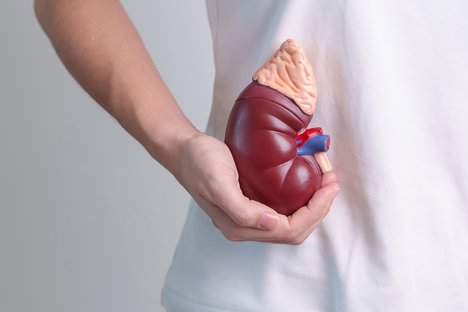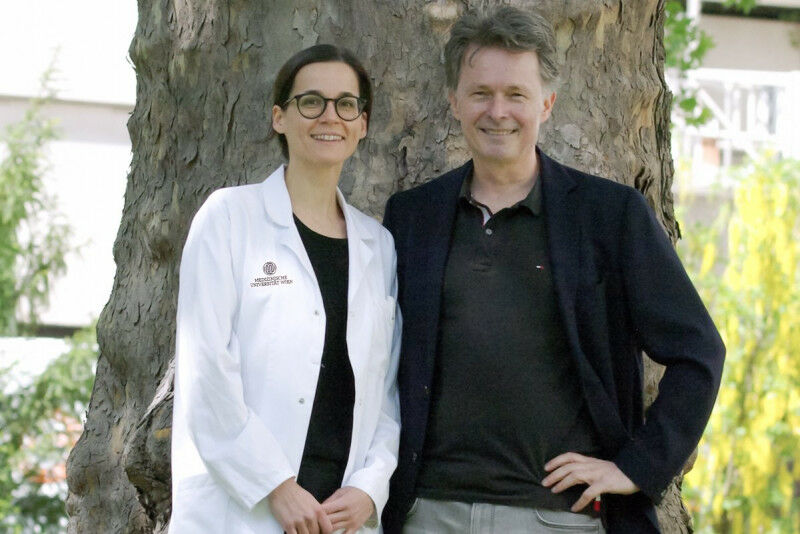博文
新疗法被证明有效对抗肾移植排斥反应
||
新疗法被证明有效对抗肾移植排斥反应
诸平
First author Katharina Mayer und study leader Georg Böhmig (c) MedUni Wien
据奥地利维也纳医科大学(Medical University of Vienna简称MedUni Wien)2024年5月27日提供的消息,新疗法被证明有效对抗肾移植排斥反应(New therapy proven effective against rejection in kidney transplantation)。
抗体介导的排斥反应(Antibody-mediated rejection简称AMR)是肾移植失败最常见的原因之一。然而,迄今为止,没有任何治疗方法被证明能长期有效地对抗这种并发症。作为国际和多学科临床研究的一部分,由Georg Böhmig和凯塔琳娜·迈尔(Katharina Mayer)领导,MedUni Wien和维也纳大学医院医学第三部肾脏学和透析临床科(Clinical Division of Nephrology and Dialysis, Department of Medicine III at MedUni Vienna and University Hospital Vienna),移植医学(transplant medicine)的一种新的治疗原则已经被发现既安全又高效。相关研究结果2024年5月25日已经在《新英格兰医学杂志》(New England Journal of Medicine)网站发表——Katharina A. Mayer, Eva Schrezenmeier, Matthias Diebold, Philip F. Halloran, Martina Schatzl, Sabine Schranz, Susanne Haindl, Silke Kasbohm, Alexander Kainz, Farsad Eskandary, Konstantin Doberer, Uptal D. Patel, Jaideep S. Dudani, Heinz Regele, Nicolas Kozakowski, Johannes Kläger, Rainer Boxhammer, Kerstin Amann, Elisabeth Puchhammer-Stöckl, Hannes Vietzen, Julia Beck, Ekkehard Schütz, Aylin Akifova, Christa Firbas, Houston N. Gilbert, Bilgin Osmanodja, Fabian Halleck, Bernd Jilma, Klemens Budde, Georg A. Böhmig. A Randomized Phase 2 Trial of Felzartamab in Antibody-Mediated Rejection. New England Journal of Medicine, 2024, DOI: 10.1056/NEJMoa2400763. Published May 25, 2024. https://www.nejm.org/doi/full/1-0.1056/NEJ-Moa2400763
这项研究涉及22名2021~2023年间在维也纳大学医院(University Hospital Vienna)和德国柏林查瑞特大学医学院(Charite - Universitatsmedizin Berlin)接受肾脏移植后被诊断为抗体介导排斥反应(AMR)的患者。在一项随机、双盲和安慰剂对照研究设计中,患者接受非扎他明(felzartamab)或无药理作用的药物(安慰剂)。
非扎他明是一种特异性-单克隆CD38(monoclonal CD38)-抗体,最初是作为一种免疫疗法开发的,通过消除骨髓中的肿瘤细胞来治疗多发性骨髓瘤(multiple myeloma)。“由于其影响免疫反应的独特能力,非扎他明也引起了移植医学研究者的兴趣,”此项研究的负责人Georg Böhmig解释说,最近的发展主要归功于他的倡议。“我们的目标是评估抗体作为肾移植后AMR的潜在治疗选择的安全性和有效性,”上述论文的第一作者凯塔琳娜·迈尔补充道。经过6个月的治疗期和相当的观察期,研究人员能够报告有希望的结果:最值得注意的是,移植活检的形态学分析和分子分析表明,非扎他明具有有效和安全地对抗肾移植AMR的潜力。
可能取得突破(Possible breakthrough achieved)
肾移植是奥地利最常见的器官移植形式,每年进行约330例移植手术。抗体介导的排斥反应(AMR)是最常见的并发症之一,当器官接受者的免疫系统产生针对外来器官的抗体时就会发生。这可能导致肾功能丧失,通常导致需要进一步透析甚至重复移植。因此,治疗AMR不仅对患者的健康至关重要,而且对有效利用已经供应有限的供体器官也至关重要。凯塔琳娜·迈尔补总结道:“我们的研究结果可能代表了肾移植排斥治疗的一个突破。”Georg Böhmig乐观地展望未来时说:“我们的发现也带来了希望,非扎他明可以抵消其他供体器官,如心脏或肺移植的排斥反应。使用转基因猪器官的异种移植也可能进一步进入可能性范畴。”
移植医学大有希望(Great hope for transplant medicine)
这项跨学科的II期研究是第一个证明晚期AMR有效治疗的临床研究项目,是与维也纳医科大学(MedUni Vienna)和维也纳大学医院(University Hospital Vienna)的几个部门合作进行的,包括临床药理学部{Department of Clinical Pharmacology (Bernd Jilma)}。还涉及与德国柏林查瑞特大学医学院{Charite - Universitatsmedizin Berlin (Klemens Budde)}、巴塞尔大学医院(University Hospital Basel)、加拿大阿尔伯塔大学(University of Alberta, Canada)和美国初创企业人类免疫学生物科学(US start-up Human Immunology Biosciences)等机构的国际合作。对于药物批准至关重要的下一步是在多中心III期研究中验证结果,该研究目前正在根据目前的研究结果进行规划。
上述介绍,仅供参考。欲了解更多信息,敬请注意浏览原文或者相关报道。
BACKGROUND
Antibody-mediated rejection is a leading cause of kidney-transplant failure. The targeting of CD38 to inhibit graft injury caused by alloantibodies and natural killer (NK) cells may be a therapeutic option.
METHODS
In this phase 2, double-blind, randomized, placebo-controlled trial, we assigned patients with antibody-mediated rejection that had occurred at least 180 days after transplantation to receive nine infusions of the CD38 monoclonal antibody felzartamab (at a dose of 16 mg per kilogram of body weight) or placebo for 6 months, followed by a 6-month observation period. The primary outcome was the safety and side-effect profile of felzartamab. Key secondary outcomes were renal-biopsy results at 24 and 52 weeks, donor-specific antibody levels, peripheral NK-cell counts, and donor-derived cell-free DNA levels.
RESULTS
A total of 22 patients underwent randomization (11 to receive felzartamab and 11 to receive placebo). The median time from transplantation until trial inclusion was 9 years. Mild or moderate infusion reactions occurred in 8 patients in the felzartamab group. Serious adverse events occurred in 1 patient in the felzartamab group and in 4 patients in the placebo group; graft loss occurred in 1 patient in the placebo group. After week 24, resolution of morphologic antibody-mediated rejection was more frequent with felzartamab (in 9 of 11 patients [82%]) than with placebo (in 2 of 10 patients [20%]), for a difference of 62 percentage points (95% confidence interval [CI], 19 to 100) and a risk ratio of 0.23 (95% confidence interval [CI], 0.06 to 0.83). The median microvascular inflammation score was lower in the felzartamab group than in the placebo group (0 vs. 2.5), for a mean difference of −1.95 (95% CI, −2.97 to −0.92). Also lower was a molecular score reflecting the probability of antibody-mediated rejection (0.17 vs. 0.77) and the level of donor-derived cell-free DNA (0.31% vs. 0.82%). At week 52, the recurrence of antibody-mediated rejection was reported in 3 of 9 patients who had a response to felzartamab, with an increase in molecular activity and biomarker levels toward baseline levels.
CONCLUSIONS
Felzartamab had acceptable safety and side-effect profiles in patients with antibody-mediated rejection. (Funded by MorphoSys and Human Immunology Biosciences; ClinicalTrials.gov number, NCT05021484; and EUDRACT number, 2021-000545-40.)
https://blog.sciencenet.cn/blog-212210-1435819.html
上一篇:惊人的500%激增:结直肠癌发病率在美国年轻人中飙升
下一篇:芭芭拉·约瑟夫及2024勒什青年研究奖

